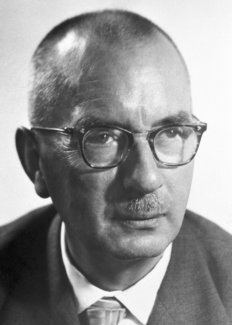Karl Ziegler
Biographical

Karl Ziegler was born in Helsa near Kassel in Germany, on November 26, 1898. He graduated in 1920 under Prof. von Auwers at the University of Marburg/Lahn, and qualified as a lecturer in 1923. After working for a short period at the University of Frankfurt/Main, he spent 10 years as a lecturer at Heidelberg.
His research work in the field of radicals with trivalent carbon and his syntheses of multi-membered ring systems earned him the Liebig Medal in 1935. In 1936 he became Professor and Director of the Chemisches Institut at the University of Halle/Saale. In the same year he lectured as a visiting professor at Chicago University.
From 1943 until 1969 he was Director of the Max-Planck-Institut fur Kohlenforschung (formerly known as the Kaiser-Wilhelm-Institut fur Kohlenforschung) in Mülheim/Ruhr. He continues his active association with the Institute in his capacity of Scientific Member. After the war he was instrumental in the foundation of the Gesellschaft Deutscher Chemiker, whose president he was for five years. From 1954 until 1957 he was president of the Deutsche Gesellschaft für Mineralölwissenschaft und Kohlechemie.
His research work at the above-mentioned institute over the past 20 years on syntheses and reactions in the chemistry of organ aluminium compounds, his discovery of organometallic mixed catalysts for the polymerization of olefins (e.g. the synthesis of high-density polyethylene) – all these are widely known.
Many honours have been bestowed upon him. He holds honorary doctorates at the Technische Hochschulen of Hannover and Darmstadt, and of the Universities of Heidelberg and Giessen. He has received the Liebig Medal from the Verein Deutscher Chemiker, the Carl Duisberg Plakette from the Gesellschaft Deutscher Chemiker, the Carl Engler Medal from the Deutsche Gesellschaft für Mineralölwissenschaft und Kohlechemie, and the Lavoisier Medal from the Société Chimique de France. The Werner von Siemens Foundation awarded him the Siemens Ring. His Nobel Prize was followed by the award of a distinguished order by the German Federal Government, the Swinburne Medal by the Plastics Institute, London, the International Synthetic Rubber Medal by Rubber and Plastics Age, London, and, in 1971, the Carl Dietrich Harries Plakette by the Deutsche Kautschuk Gesellschaft, as well as the Wilhelm Exner Medal by the Österreichischer Gewerbeverein, Vienna. He is an honorary senator of the Max-Planck Gesellschaft, founder president (1970-1972 ) of the Rheinisch-Westfalische Akademie der Wissenschaften, as well as member or honorary member of various German and foreign scientific societies and academies. In 1971, The Royal Society, London, elected him as a Foreign Member.
On the death of Otto Hahn, Karl Ziegler was appointed the latter’s successor to the Order “Pour le mérite für Wissenschaften und Künste”.
Karl Ziegler has been married to Maria Kurtz, since 1922. His daughter, Marianne Witte, is a doctor of medicine and is married to the chief physician of a children’s hospital in the Ruhr. His son, Dr. Erhart Ziegler, is a physicist and patent attorney. Karl Ziegler has five grandchildren by his daughter and five by his son.
This autobiography/biography was written at the time of the award and first published in the book series Les Prix Nobel. It was later edited and republished in Nobel Lectures. To cite this document, always state the source as shown above.
Karl Ziegler died on August 12, 1973.
Nobel Prizes and laureates
Six prizes were awarded for achievements that have conferred the greatest benefit to humankind. The 14 laureates' work and discoveries range from quantum tunnelling to promoting democratic rights.
See them all presented here.
